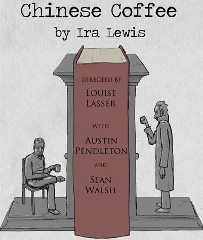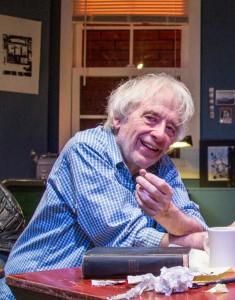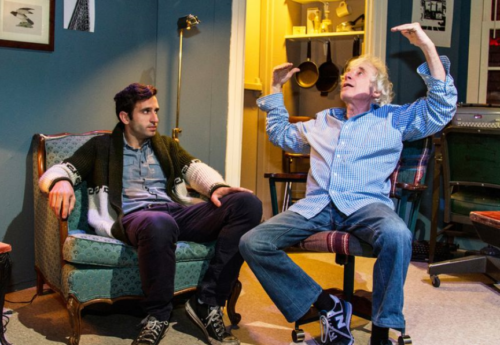WHEN BEING A STARVING WRITER
IS NO LONGER ROMANTIC
Austin Pendleton’s breathtaking performance and Ira Lewis’s penetrating script make Chinese Coffee, with all its flaws, a most worthwhile outing. In fact, at $18 a ticket, this show, directed by Louise Lasser, is all but mandatory viewing for lovers of personal, intimate theater, as well as for any intellectually minded individual with artistic aspirations.
Alone in his shabby Greenwich Village studio at 1:15 in the morning, 51-year-old photographer Jacob (“Jake”) Manheim (Mr. Pendleton) seems restless; a knock on the door heralds the arrival of his 44-year-old starving-writer friend Harry Levine (Sean Walsh). Harry’s come to collect the $473 that Jake owes him. He’s also come to ask what Jake thought of his new novel, the manuscript of which he’d given to him sometime earlier. What follows is a loving but brutal dissection of these two intelligent and talented failures and their relationship.
Jake seems the more insightful, more sensitive of the two. Until recently he was making good money as a nightclub photographer. He began doing this as a teenager out of financial necessity; later on he did it to support his and his woman’s party lifestyle. But Jake was cursed with profound artistic sensibilities, and we can surmise that part of what gave him strength to do mercenary work was the notion that it was only temporary, and that one day he would create something vital, maybe write a book, though he’s hardly ever written a thing. But now his woman is gone, and at 51 the time for action’”to try to be an artist’”has passed. Jake is trapped in a sort of limbo: The only way he knows how to make money’”taking flattering portraits for hire’”now sickens him. Consequently, he’s desperately poor, his only asset a jar half-full of pennies. He is a prisoner of his artistic conscience. It makes him desire beauty, and gives him the power to recognize it, but not to create it. Or maybe he can create a little bit, sometimes, just enough to ignite a longing in his heart but not enough to satiate it. It’s like he’s trapped in someone else’s dream, over which he has no control.
Whereas Jake is on the wrong side of too late, Harry, at 44, is teetering on its brink. Though he’s published two novels and has an agent, he’s destitute, often mistaken for a homeless man; even new shoelaces are a strain on his budget. Before, the whole Greenwich Village-starving-writer-in-a-basement-room thing appealed to him. But now it’s become an oppressive weight and he needs to get out from under it. His hope is that this latest novel is not only good but will also be popular and make him some money, maybe even finally catapult him into the realm of the successful. But Jake, whose opinion Harry values more than anyone’s, advises Harry to forget his novel and take up another line of work to make money, advertising perhaps, maybe screenwriting.
These two are a mirror for anyone who’s serious about creating art but whose success in this area has been dubious; I myself am intimate with artistic individuals who have had conversations with their likeminded friends that were nearly identical to the ones in this script. Often funny but ultimately painful, Mr. Lewis’s play is a thoughtful and thorough investigation of these two characters, both as people and as archetypes. Mr. Pendleton captivates with the remarkable truthfulness and spectacular energy of his performance. Mr. Walsh too delivers a fine portrayal, though at moments his energy level and conviction seem to lag. My guess is that this is the result of the show being under-rehearsed. Both actors flub lines on occasion. But whereas Mr. Pendleton manages, on the fly, to turn these hiccups into little gems that add to his character, Mr. Walsh, when he encounters a problem, smooths out the mistake, quickly recovers and moves on. The difference is subtle but noticeable. Ms. Lasser’s direction feels strong with respect to character work but seems less inspired when it comes to other theatrical elements, like blocking or exploring Jake and Harry through action. The first hour of this 100-minute show is pretty static, with Harry sitting in a chair and Jake counting pennies on Alison Buatti’s small, realistic set. This seems to be a choice Ms. Lasser makes, perhaps to contrast with the sudden movements towards the show’s end, but I’m not certain it works all that well.
photos by Bobby Caputo
Chinese Coffee
On The Wind Productions
Off-Broadway Theater
Roy Arias Stage II Theater, 300 West 43rd St. at 8th Ave.
ends on October 3, 2014
for tickets, call 866.811.4111 or visit Roy Arias Stages



